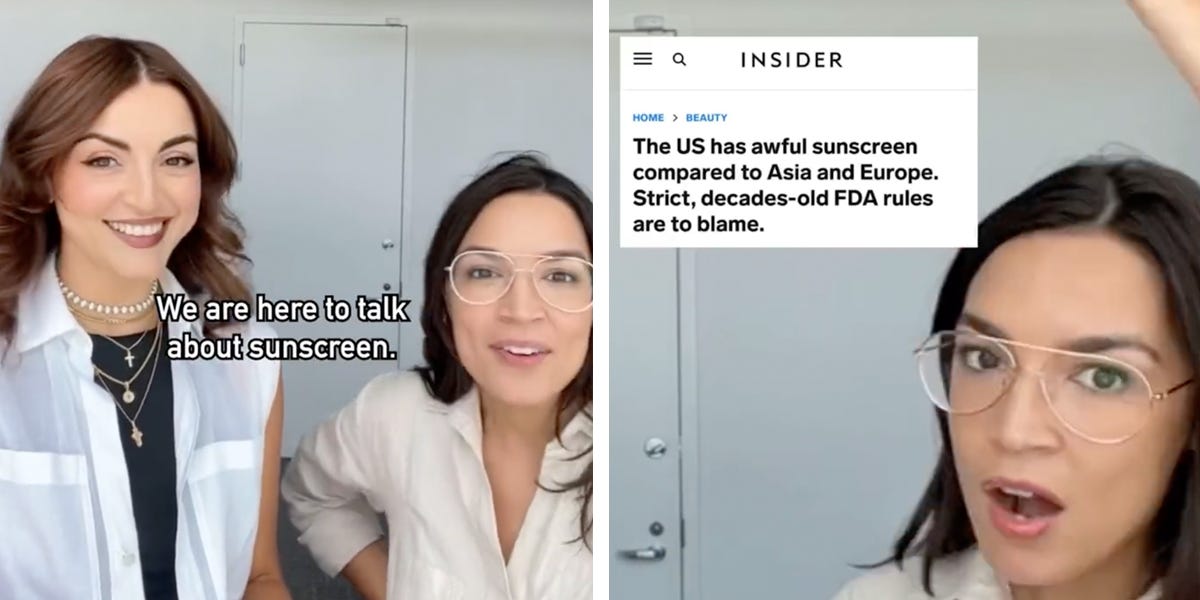Read to decide whether you think this is good or bad
If you’ve ever avoided reapplying American sunscreen because it leaves a white cast or you still somehow still get burned anyway, you’re not alone.
Some Americans are even bringing back sunscreen from abroad, lugging French bottles in their suitcases or paying extra fees to get Asian sunscreens shipped internationally.
But Rep. Alexandria Ocasio-Cortez just proposed a simpler solution: Why not just make US sunscreens better?
“US sunscreens are far behind the rest of the world,” the representative said in a TikTok video with Charlotte Palermino, a licensed esthetician.
In the video, Ocasio-Cortez noted that she traveled to South Korea earlier this year, and noticed how “far advanced” the rest of the world is in terms of sunscreen formulas — and felt that Americans deserve better products, too.
Ocasio-Cortez — citing Insider’s previous reporting — pointed out that the FDA regulates sunscreen as a drug rather than a cosmetic product, making the approval process for new UV filters much slower than in other countries.
In the video, Ocasio-Cortez said that there are things the US can do to change this FDA rule.
“Congress has not been very aware of this issue,” she said, explaining the lack of action to fix it.
“Really, it’s not too corny — please contact your member of Congress,” she said. She noted that Congress members who sit on the Energy and Commerce committee in particular have some jurisdiction over the FDA.
When calling, she suggested asking members to push for looser FDA restrictions on sunscreen and more funding for public research.
Dr. Ellen Gendler, a dermatologist practicing in New York City, previously told Insider that US sunscreens are “very good” at blocking UVB rays — the ones that cause sunburn.
But, Gendler said, when it comes to protecting against UVA rays (which penetrate the skin more deeply and might be more harmful than UVB rays), our sunscreen formulas are lacking.
It’s why you can still tan a lot when wearing sunscreen; plus, UVA rays are also linked to skin cancer.
Due to more relaxed regulations, countries like France, South Korea, the UK, Japan, and Australia all have more protective sunscreens that also boast smoother application.
Gendler’s favorite international sunscreen is La Roche Posay’s SPF 50 Anthelios UVMune 400, which uses Mexoryl 400, an advanced version of one of the best UVA-blocking ingredients. She stocks up on it every time she’s in France because the American version of the same sunscreen can’t use that ingredient.



Because loosening regulations results in better products
Regulatory Capture is unironically a thing, though. We’ve seen that in Schedule I drug policy as explicitly as anywhere. Everything from marijuana to magic mushrooms and now fentanyl has been flagged as “no medical use” because national media made it a scary subject for a few years. Now we’re stuck with a host of suboptimal alternatives and a “tough it out” theory of pain and stress management that causes far more harm than any drug ever did.
Also, consider immigration policy, the pinnacle of draconian and cynically enforced state labor regulations. Or our regulations on marriage and sexual practices, used to persecute LGBT and inter-racial couples for decades.
Ratcheting up regulations forever isn’t actually good. In many instances it is bad. At some level, you need to recognize when adding layers of bureaucracy serves a social engineering or market capture purpose rather than a health and safety purpose.
The theory that oversees generic drugs and face creams are significantly more hazardous than anything the US produces domestically… I don’t know how well that’s borne out.
the anti-worker cruelty is the point
Don’t forget “public funded research”. Why invest when you can have the taxpayers fund your startup? Oh and you get to keep all the profits!
Honestly though the FDA is way too strict on the things they need to be less strict on and not nearly strict enough where they should be. They should’ve approved some of these ingredients 15+ years ago.
yay: sunscreen with alcohol: to be unskinned alive